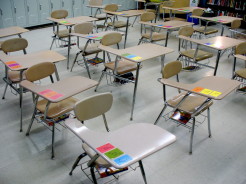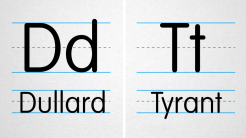The West Hartford, Connecticut School district is considering a new policy that would allow administrators to discipline teachers if they post photographs on websites like Facebook that reflect poorly on their in-school work.
“The policy would be aimed specifically at photos on Facebook that depict drunken behavior that could reflect poorly on the classroom,” according the the report.
While I am not entirely against this policy, knowing full well that there are instances in which a careful balance between First Amendment rights and occupational responsibilities must be achieved, this seems like a policy that would be fraught with possible inconsistencies and almost impossible to enforce.
In terms of enforcement, the majority of Facebook users keep their information private, meaning that only their friends have access to photographs, status updates, and other data posted online. If a teacher posts photographs of excessive alcohol use from a bachelor party, and those photos can only be accessed by his friends, is this teacher in violation of the policy? And if so, why, since he has limited their distribution in order to ensure that students cannot gain access to them?
More importantly, how would the school district ever know about these images since administrators would presumably have no access to the photographs either.
Also, what happens if a teacher is tagged in a photograph by a third party? For example, a teacher vacations in Bermuda with her family, and while there, her sister takes a photograph of the teacher drinking excessively one evening at a bar. The sister then posts the photographs on her Facebook page and tags her sister, the teacher, allowing users to search on her name and locate the photograph on Facebook.
Is this teacher culpable for photographs posted by others?
Does the policy limit what a teacher can post online or what anyone can post online about the teacher?
Thankfully, I do not drink, so there are no photographs of me engaged in drunken behavior of any kind. Go to my Facebook page and you’ll find photographs of Clara and Elysha and little more. However, it seems as if 90% of all photographs posted to Facebook are taken inside bars and are chock full of depictions of drunken behavior. As a result, this could be a problem for many teachers who enjoy a perfectly legal night out at the local saloon from time to time and (for reasons I have never understood) make it a point of documenting the evening with photographic evidence.
Then there’s the issue of subjectivity when applying this policy to each individual. Who gets to decide what is a depiction of drunken behavior and what is ordinary social drinking? What if a teacher posts a photograph of herself drinking champagne at her wedding among her many other wedding photos? Would this be considered a depiction of drunken behavior?
What if a teacher posts a photograph from an evening at Fenway Park, and he has a beer in his hand. Does this depict drunken behavior? Even if the teacher eventually drinks ten beers and is thrown out of the park in the seventh inning, would a single photograph of a single beer be enough to depict drunken behavior?
In fact, how could any single image ever depict drunken behavior? Assuming that a person cannot be depicted drinking more than one alcoholic beverage at a time, how could any image truly depict drunken behavior? Unless the Facebook page contains a series of photographs from the night depicting alcohol consumption, or unless the teacher is wearing a lampshade, hanging from a chandelier, and drooling from the corners of his mouth, what type of photograph would ever provide definitive evidence of drunken behavior?
And what happens when this policy begins creeping into other areas, which is my primary concern. While I normally dismiss the slippery slope argument as illogical nonsense, what happens when the standards applied to Facebook are also applied to the author who publishes novels containing content not entirely appropriate for children?
Is a status update laced with profanity or sexually explicit references any different than a novel using the same kind of language?
Once again, I thankfully avoid all profanity when writing online, whether I’m writing on Facebook, Twitter or my blog. I do this because I am not terribly enamored with profanity and use it sparingly in my own life (though considerably more frequently on the golf course). I find it crude, simplistic and lazy. It certainly has a purpose in life (the use of profanity has actually been shown to reduce pain), but not in my everyday speech.
Some of my characters, however, do not feel the same way. They swear, they drink excessively and they have sex. As a novelist, will my subject matter and vocabulary be limited by my teaching career?
Probably not.
If Updike or Roth were teachers, would their school districts have prevented them from using profanity in their novels?
Wally Lamb is a high school English teacher in Connecticut, and his novels include sex and profanity. Did his school district attempt to censor him?
Of course not.
But when policies like this proposed Facebook policy are put into place, I worry that it might be just the first step on the road to greater censorship.
I understand a school district’s desire to ensure that its teachers are acting as role models for their students. I agree that photographs depicting excessive drinking and other questionable activities do not belong on a public Facebook page. But if these photographs are made private or the photographs are made public by the third party, then I believe that the school district has no role in disciplinary action.
After all, this proposed policy seeks to curb online behavior. Not overall behavior. If a teacher wants to drink excessively on a weekend camping trip or attend a bachelor party in a strip club (another activity that I have thankfully never engaged in), the school district should have no control over these choices. Teachers are certainly role models, but in their private lives, they are also human.
As long as teachers keep those excessively private moments in their lives private, all will be well.
But I worry about how far the heavy hand of censorship may someday extend. I love my job as a teacher and I love my career as a writer, and in my mind, never the twain shall meet.
But could there come a day when a school district decides that the book a teacher has written, the sculpture that she has sculpted, the song that he has recorded, or the painting that she has painted is just as inappropriate as a Facebook photograph or status update?
I certainly hope not.




